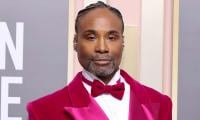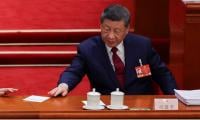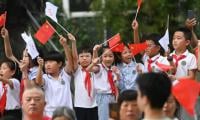Will Imran’s defiance of ECP brew a storm?
ISLAMABAD: The Election Commission of Pakistan (ECP) is confronted with a great challenge to stop Pakistan Tehreek-e-Insaf (PTI) Chairman Imran Khan, by using its legal muscle and tools, from campaigning in the high profile by-elections in sheer violation of an express law.The PTI chief has thrown down the gauntlet, a
By Tariq Butt
September 21, 2015
ISLAMABAD: The Election Commission of Pakistan (ECP) is confronted with a great challenge to stop Pakistan Tehreek-e-Insaf (PTI) Chairman Imran Khan, by using its legal muscle and tools, from campaigning in the high profile by-elections in sheer violation of an express law.
The PTI chief has thrown down the gauntlet, a move which is not unexpected from him given his disposition, to lead the canvassing from the front for Aleem Khan in Lahore and Jehangir Tareen in Lodhran in what he regards as the ‘do or die’ electoral contest. “I will be part of their election campaigns,” he declared.
Unlike the PTI chief, the other main electoral contestant, the Pakistan Muslim League-Nawaz (PML-N), has stated that it would strictly observe the code in the by-polls meaning that its top leaders would not jump in the campaign.
The relevant clause of the election code of conduct is unambiguous that places the bar. It says after the issuance of election schedule, all the federal and provincial lawmakers will neither visit any constituency nor will openly or in secret give any subscription or donation or make promise for giving such subscription or donation to any institution, nor will inaugurate, commit to undertake or announce any development project for the advancement of the campaign of a candidate of his choice to influence poll results.
The president, prime minister, chairman and deputy chairman of the Senate, speakers of assemblies, ministers of state, governors, chief ministers and advisors to the premier and chief minister, and other public office holders face the same restriction. They and any person on their behalf will not visit the constituency or a polling station after the issuance of the election schedule till the completion of poll.
Obviously, the bar is meant to ensure that nobody influences the elections in any way.
Reacting to Imran Khan’s defiance, the ECP made it clear that code was not restricted to only opposition parties. It applies to all parties and for transparency its implementation is pivotal. The ECP has banned the entry of MPs to the constituencies where by-elections are being held so as to stop them from putting influence on the polls.
On January 28, 2013, the ECP had issued the 40-point code for the general elections after consultations with all the political parties. It had provided for this prohibition.
The ban is not specific to the present by-elections, but was applicable to all previous by-polls held after the 2013 elections.
However, all these figures were permitted to campaign for their candidates when the embargo clause was shot down by the LHC some two months back on a petition filed by Mansoor Sarwar, advocate, President of the central region Punjab of the PTI. The federal government lawyer had readily agreed with the contentions raised by Mansoor Sarwar in the LHC and added that physical movement of the political leaders cannot be restrained and they cannot be barred from visiting constituencies during a poll campaign.
The ECP went into appeal against the LHC decision, and the Supreme Court suspended its operation on September 8, reviving the clause.
LHC judge Justice Syed Mansoor Ali Shah had held that the ECP cannot limit political activity or make a political party dysfunctional by putting restrictions on the movement of its leaders or members because such a freedom is grounded in constitutionally guaranteed fundamental rights.
The public office holders like the prime minister, chief ministers, federal ministers, ministers of state and advisors to the president also wear a political hat and belong to a political party, the judgment said. They are not in the service of Pakistan, it said. Hence they are free to attend to their political obligations of running a political party and are fully entitled to the guaranteed fundamental right. A political party has to freely conduct electioneering, canvassing and the electoral campaign.
This political activism, the ruling said, is the foundation of modern parliamentary democracy and cannot be restricted by the ECP. The issue of abuse of public office and public funds on a case-to-case basis can be easily addressed under the Representation of People Act, and the law will take its own course, when any such violation takes place.
The PTI chief has thrown down the gauntlet, a move which is not unexpected from him given his disposition, to lead the canvassing from the front for Aleem Khan in Lahore and Jehangir Tareen in Lodhran in what he regards as the ‘do or die’ electoral contest. “I will be part of their election campaigns,” he declared.
Unlike the PTI chief, the other main electoral contestant, the Pakistan Muslim League-Nawaz (PML-N), has stated that it would strictly observe the code in the by-polls meaning that its top leaders would not jump in the campaign.
The relevant clause of the election code of conduct is unambiguous that places the bar. It says after the issuance of election schedule, all the federal and provincial lawmakers will neither visit any constituency nor will openly or in secret give any subscription or donation or make promise for giving such subscription or donation to any institution, nor will inaugurate, commit to undertake or announce any development project for the advancement of the campaign of a candidate of his choice to influence poll results.
The president, prime minister, chairman and deputy chairman of the Senate, speakers of assemblies, ministers of state, governors, chief ministers and advisors to the premier and chief minister, and other public office holders face the same restriction. They and any person on their behalf will not visit the constituency or a polling station after the issuance of the election schedule till the completion of poll.
Obviously, the bar is meant to ensure that nobody influences the elections in any way.
Reacting to Imran Khan’s defiance, the ECP made it clear that code was not restricted to only opposition parties. It applies to all parties and for transparency its implementation is pivotal. The ECP has banned the entry of MPs to the constituencies where by-elections are being held so as to stop them from putting influence on the polls.
On January 28, 2013, the ECP had issued the 40-point code for the general elections after consultations with all the political parties. It had provided for this prohibition.
The ban is not specific to the present by-elections, but was applicable to all previous by-polls held after the 2013 elections.
However, all these figures were permitted to campaign for their candidates when the embargo clause was shot down by the LHC some two months back on a petition filed by Mansoor Sarwar, advocate, President of the central region Punjab of the PTI. The federal government lawyer had readily agreed with the contentions raised by Mansoor Sarwar in the LHC and added that physical movement of the political leaders cannot be restrained and they cannot be barred from visiting constituencies during a poll campaign.
The ECP went into appeal against the LHC decision, and the Supreme Court suspended its operation on September 8, reviving the clause.
LHC judge Justice Syed Mansoor Ali Shah had held that the ECP cannot limit political activity or make a political party dysfunctional by putting restrictions on the movement of its leaders or members because such a freedom is grounded in constitutionally guaranteed fundamental rights.
The public office holders like the prime minister, chief ministers, federal ministers, ministers of state and advisors to the president also wear a political hat and belong to a political party, the judgment said. They are not in the service of Pakistan, it said. Hence they are free to attend to their political obligations of running a political party and are fully entitled to the guaranteed fundamental right. A political party has to freely conduct electioneering, canvassing and the electoral campaign.
This political activism, the ruling said, is the foundation of modern parliamentary democracy and cannot be restricted by the ECP. The issue of abuse of public office and public funds on a case-to-case basis can be easily addressed under the Representation of People Act, and the law will take its own course, when any such violation takes place.
-
 Nicole Kidman's Daughter Sunday Rose Under Intense Backlash Post-Keith Urban Divorce
Nicole Kidman's Daughter Sunday Rose Under Intense Backlash Post-Keith Urban Divorce -
 Teddi Mellencamp Reveals Medication Side-effects Landed Her In The Hospital
Teddi Mellencamp Reveals Medication Side-effects Landed Her In The Hospital -
 Chase Stokes Calls Out Morgan Evans Over Comments On Kelsea Ballerini Split
Chase Stokes Calls Out Morgan Evans Over Comments On Kelsea Ballerini Split -
 Elon Musk Says Legal Pressure Forced Him To Pay Full Price For Twitter
Elon Musk Says Legal Pressure Forced Him To Pay Full Price For Twitter -
 Sarah Ferguson’s Downfall & Housing Crisis: Pals Make A Decision On Radioactive Ex-Duchess
Sarah Ferguson’s Downfall & Housing Crisis: Pals Make A Decision On Radioactive Ex-Duchess -
 Taylor Swift Faces Awkward Situation Ahead Of Her Wedding To Travis Kelce
Taylor Swift Faces Awkward Situation Ahead Of Her Wedding To Travis Kelce -
 Anthropic, Pentagon Resume Talks On ‘high Stakes’ AI Defense Deal
Anthropic, Pentagon Resume Talks On ‘high Stakes’ AI Defense Deal -
 OpenAI Annualized Revenue Hits $25 Billion Milestone Amid Global Adoption Surge
OpenAI Annualized Revenue Hits $25 Billion Milestone Amid Global Adoption Surge -
 Princesses Beatrice, Eugenie’s Parents Hurt Their Future With William, Kate: ‘The Knives Are Out’
Princesses Beatrice, Eugenie’s Parents Hurt Their Future With William, Kate: ‘The Knives Are Out’ -
 Billy Porter Claims He Came Back From The Dead Amid Sepsis Battle
Billy Porter Claims He Came Back From The Dead Amid Sepsis Battle -
 Jason Dickinson Reportedly Headed To Oilers In Trade With Chicago Blackhawks
Jason Dickinson Reportedly Headed To Oilers In Trade With Chicago Blackhawks -
 Harry Styles Hints He's Ready For Marriage And Family Life
Harry Styles Hints He's Ready For Marriage And Family Life -
 David Harbour’s Ex Faced Extreme Humiliation At Lily Allen’s Producer's Birthday Bash
David Harbour’s Ex Faced Extreme Humiliation At Lily Allen’s Producer's Birthday Bash -
 China Targets Tech Innovations Amid High Stakes Rivalry With US: Key Strategies Explained
China Targets Tech Innovations Amid High Stakes Rivalry With US: Key Strategies Explained -
 Pacers Vs Clippers: Kawhi Leonard Powers Clippers Past Pacers For Third Straight Win
Pacers Vs Clippers: Kawhi Leonard Powers Clippers Past Pacers For Third Straight Win -
 Scientists Build Tiny AI Brain Model Using Monkey Neurone Data
Scientists Build Tiny AI Brain Model Using Monkey Neurone Data



